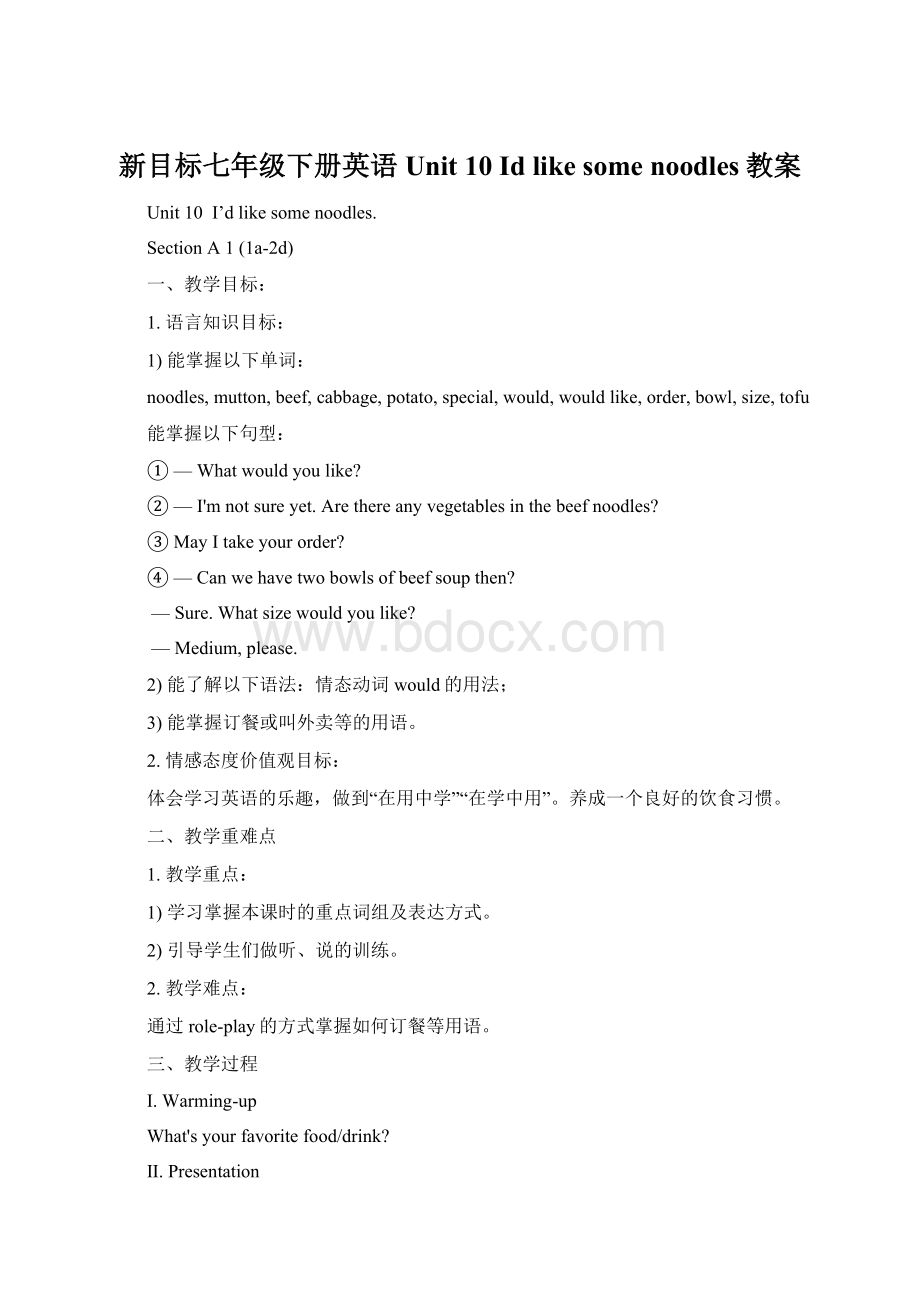新目标七年级下册英语Unit 10 Id like some noodles教案文档格式.docx
《新目标七年级下册英语Unit 10 Id like some noodles教案文档格式.docx》由会员分享,可在线阅读,更多相关《新目标七年级下册英语Unit 10 Id like some noodles教案文档格式.docx(14页珍藏版)》请在冰豆网上搜索。

通过role-play的方式掌握如何订餐等用语。
三、教学过程
Ⅰ.Warming-up
What'
syourfavoritefood/drink?
Ⅱ.Presentation
1.(showsomepicturesoffoodonthebigscreen)
PresentsomenewwordsandexpressionstotheSs.
2.Sslearnthenewwordsandexpressionsbythemselvesandtrytorememberthem.
3.Workon1a:
Readthewordsontheleftandlookatthepicturesontheright.Writethelettersofthefoodontheline.Thenchecktheanswers.
Ⅲ.Game(Guessthefood.)
(Showsomepicturesoffoodonthebigscreen)
LetSsguesswhatfooditis.
Ⅳ.Listening
T:
Inthefollowingconversation,onemanisorderingsomefood.Now,let’slistentothetape,findouttherightnoodlesthepersonorders.
PlaytherecordingfortheSstolistenandchecktheanswers.
Ⅴ.Pairwork
Workon1c.
1.Maketheirownconversationsusingthenoodlesinthepicture.
2.Letsomepairsactouttheirconversations.
Ⅵ.Listening
1.Workon2a;
Now,lookatthepicturesontheright,listentotheconversationsandcheckthenamesofthefoodsyouhear.
Playtherecordingforthefirsttime,studentsonlylistencarefully.Then,listentotherecordingagain,andcheckthenamesofthefoods.Checktheanswers.
2.Workon2b:
PlaytherecordingfortheSstolistenandcompletethesentences.
Playtherecordingtwice.ThefirsttimeSsjustlisten.Andthesecondtime,Sslistenandwritedownthewords.
Ifnecessary,usethepausebuttontohelpSs.
3.Checktheanswers.
Ⅶ.Pairwork
1.Askandanswerquestionswithyourpartner.Usetheinformationin2a.
2.Showtheconversationsof2aonthebigscreentotheSs.
3.MakeamodelfortheSs.
Whatkindofnoodleswouldyoulike?
S1:
I'
dlikebeefnoodles,please.
…
3.Ssworkinpairsandpracticetheconversations.
Ⅷ.Reading
1.Learnsomenewwords.
2.AskSstoreadtheconversationin2dandfindtheanswertothisquestion:
Whatwouldtheylike?
(Theywouldlikeonelargebowlofbeefsoup,onegongbaochicken,andonemapotofuwithrice.)
3.ChecktheanswerswiththeSs.
4.Ssworkwiththeirpartnersandrole-playtheconversation.
.Languagepoints
1.Whatkindofnoodleswouldyoulike?
wouldlike表示“想要”,与want同义,但比want更委婉。
wouldlike中的would可缩写为’d。
wouldlike没有人称和数的变化,后面可接名词,可用于wouldliketodosth.结构中,表示“愿意做某事”,还可用于wouldlikesb.todosth.,表示“想让某人做某事”。
如:
Iwould/I’dlikeasmallbowlofsoup.
我想要一小碗汤。
Shewould/She’dliketoplaytennis.
她想打网球。
Myfatherwouldlikemetogohomeearly.
我爸爸想让我早点回家。
Wouldyoulikesth.?
(你想要……吗?
)常用来委婉地提供帮助。
其肯定回答常用Yes,please等;
其否定回答常用No,thanks等。
—Wouldyoulikemuttonnoodles?
你想要羊肉面吗?
—Yes,please./No,thanks.
是的。
/不,谢谢。
【运用】
根据各题后括号内的要求完成下列各题。
(1)Thegirlwantssomeorangejuice.(改为同义句)
__________________________________
(2)Wouldyoulikesomedumplings?
(作肯定及否定回答)
(3)她愿意在数学方面帮助我。
(翻译成英语)
___________________________________
(4)我想让我朋友和我打篮球。
2.MayItakeyourorder?
你可以点菜了吗?
也可以说“CanItake(have)yourorder?
”,“Areyoureadytoorder?
”这些都是服务员请客人点菜的礼貌用语。
—MayItakeyourorder?
—Yes.I’dlikesomemapotofuwithrice.
3.abowlof一碗……
twobowlsof两碗……
e.g.I’dlikeabowlofbeefcabbagenoodles.
我想要一碗牛肉洋白菜面。
We’dliketwobowlsofmuttoncarrotssoup.
我们想要两碗羊肉胡萝卜汤。
.Exercises
Homework
1.Reviewthewordsandexpressionsinthisperiod.
2.Writeashortconversationtoordersomenoodlesyoulikeinarestaurant.
SectionA2(GrammarFocus-3c)
1)继续练习运用如何订餐或叫外卖等的用语。
2)根据所提供的材料能运用所学的知识来补全对话。
3)总结复习订餐时所用句型结构。
体会学习英语的乐趣,做到“在用中学”“,在学中用”。
1)总结订餐所用语言及句子结构。
2)学习理解情态动词would的用法。
3)通用所学的知识在实际情境中订餐。
1)在较为真实的订餐语境中会运用学过的语言知识来补全对话。
2)能掌握订餐的用法,并在实际情境中运用。
Ⅰ.GrammarFocus.
1.学生阅读GrammarFocus中的句子,然后做填空练习。
①你想要什么面条?
______________________________________
请给我来牛肉面。
________________________
②你想要什么碗的?
_______________________
请给我来中碗的。
________________________________
③你想来一个大碗吗?
____________________________________
好的。
______________________
4西红柿鸡蛋汤里有肉吗?
_______________________________
不,没有。
_______________________
I’d=____________
She’d=_________
不可数名词有:
bread,milk,water,_____________________________
既是可数又是不可数的名词:
salad,chicken,icecream,____________
2.Ssfinishoffthesentencesandchecktheanswersbythemselves.
.探究乐园
wouldlike句型
1.wouldlike意为“想要某物”,常用句式结构:
你想要点什么?
What______you______?
我想要一杯茶。
_________acupoftea.
你想要什么面条?
What____ofnoodles_____youlike?
你想要多大号的毛衣?
What____ofsweater______youlike?
(以上句型为有礼貌、委婉地表达征求对方的要求)
2.Wouldyoulike…?
你想要……吗?
这也是用来向对方有礼貌地语气委婉地征求对方要求的句型。
其答语为:
Yes,please./OK./No,thanks.
你想要一些牛奶吗?
______you_____somemilk?
是的,谢谢。
Yes,_______./No,_______.
【拓展】Wouldyouliketodosth.?
你愿意做某事吗?
用来有礼貌地向对方提出建议或邀请的句型。
答语常为“Yes,I’dliketo.”/“Sorry,…”
可数名词与不可数名词
1.可数名词:
可数名词有单数、复数之分。
其复数形式一般要加-s或-es。
potato—_______;
tomato—__________
2.不可数名词没有复数形式,只有单数形式。
some______(米饭);
alotof_____(牛肉)
(1)不可数名词表示数量的多少时,必须与表示数量的名词连用,即“数词+表示数量的名词(可数名词)+of+不可数名词”,如:
两玻璃杯果汁三碗米饭
___________ofjuice___________ofrice
(2)不可数名词做主语时,谓语动词只能用单数形式。
例如:
碗里有一些羊肉汤。
There__________muttonsoupinthebowl.
【拓展】如果不可数名词前有复数名词短语修饰时,谓语动词须用复数形式。
房间里有两袋大米。
____________twobagsofriceintheroom.
Ⅲ.Pairwork
1.Workon3a.TellSstocompletetheconversationwithsentencesontheright.
2.Ssworkbythemselvesandcompletetheconversation.
3.ChecktheanswerswiththeSs.
4.LetSspracticetheconversationsinpairs.
Ⅳ.Writing
1.Workon3b.
TellSstowritequestionsandanswersusingthewordsinthebrackets.
GiveamodeltotheSs.
Whatkindofnoodleswouldyoulike?
2.指导:
看提示词,确定句子是对什么事情提问,检查句子的语序是否正确。
最后,再根据自己的实际情况回答些问题。
3.Practicetheconversationwithyourpartners.
Ⅴ.Groupwork
1.Lookatthepictures.Therearefourkindsofspecialfoods.
Whowouldlikethem,pleasemakesurveyofyouclassmates.
2.GiveSsamodel:
S1:
Anna,Whatwouldyoulike?
S2:
dlikebeefnoodleswithcabbage.
…
3.Writetheresultonapieceofpaperandwriteareport.
4.Readyourreportinyourgroup.
Ⅵ.Exercise
Homework
1.RememberthesentencesintheGrammarFocus.
2.Makesomeconversationstoaskyourfriendswhatfoodtheywouldlike.
SectionB1(1a-2c)
world,answer,different,cake,candle,age,blow,blowout,if,will,UK,candy,lucky,popular,cutupidea
2)能掌握以下句型:
①Theanswerwouldbedifferentindifferentcountries.
②Thenumberofcandlesistheperson'
sage.
③InChina,it'
sgettingpopular
了解世界各地的饮食文化,生日文化等事情,使学生们具有初步的世界文化观念。
1)通过进行听、说的训练,来提高学生们综合运用所学知识的能力。
2)通过读、写的训练,来让学生们能真正在实际活动中运用所学的知识。
2.教学难点
听力训练与阅读训练
Ⅰ.Warming-up
Let’swatchavideoandlearn.
PresentsomenewwordsandexpressionstotheSs.
Readthewordsinthechartandlookatthepicturesbelow.Writethelettersofthefoodsordrinksontheline.Thenchecktheanswers.
4.LetSstrytorememberthenewwordsandexpressions.
Ⅲ.Talking
1.Circlethethingsyoulikein1a.Putanхnexttothethingsyoudon’tlikeThentellyoupartnerwhatyoulikeanddon'
tlike.
Sa:
Ilikedumplings,butIdon'
tlikenoodles.
Sb:
Well,IlikefishbutIdon'
tlikemeat.
2.Workingroups.Talkaboutwhatyoulikeandwhatyoudon’tlike.
3.Makealistofthingseveryonelikesanddislikesinyourgroup.Thengiveareporttoyourclassmates:
4.LetsomeSsgivetheirreport.
1.Workon1c
1)AskSstoreadtheORDERFORMcarefully.
2)PlaythetapefortheSstolistenandcompletethefoodorderform.
Playtherecordingforthefirsttime,studentsonlylistencarefully.Then,listen
Totherecordingagain,andwritedownthenamesofthefoods.
2.Workon1d
Listenagain.UsethepausebuttontochecktheanswerswiththeSs.
Ⅴ.Presentation
1.(showsomepicturesofthenewwordsinthepassageonthebigscreen)
PresentsomenewwordsandexpressionstotheSs.
Ⅵ.Talking
1.Workingroups.Discusswhatdoyoudooreatonyourbirthday?
2.Sstaketurnstotalkaboutit.
Iusuallygetmanynicegiftsfrommyparents.Iusuallyhaveanicedinnerinarestaurant.
S2:
Myparentsusuallybuymesomenicebooksandschoolthingsonmybirthday.
S3:
….
3.Writedownwhatyourgroupmembersdoontheirbirthday.Andgiveareporttotheclass.
Ⅶ.Reading
1.Fastreading
Readthearticle.JudgeYes(Y)orNo(N)ofthesentences.
1)____Thenumberofcandlesonthebirthdaycakeistheperson’sage.
2)____IntheUK,whenthechildhasthebirthdaycakewiththecandy,he/sheislucky.
3)____InChina,peopleeatnoodlesont